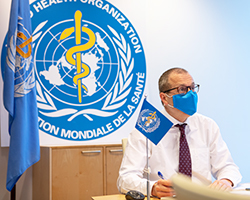WHO/Europe reports on unprecedented year at 148th Executive Board session

WHO/U. Borregaard
Last week saw the conclusion of the 148th session of the WHO Executive Board, where members agree on the agenda and resolutions to be considered for the next World Health Assembly, to be held in May.
With 8 Member States from the WHO European Region represented on the Executive Board, and many more taking part actively in the discussions, the Region was well represented throughout the proceedings. On the important and most debated agenda item – the proposed Programme Budget 2022–2023 – all 53 European Region Members States agreed on a joint regional statement, which was proposed by Switzerland and delivered by the Russian Federation. This statement called for strengthening WHO to enable it to act effectively and independently to fulfil its mandate, while enhancing accountability and transparency at all levels of the Organization.
Throughout the session, WHO/Europe provided support to its Member States. The Regional Director for Europe, Dr Hans Henri P. Kluge, hosted daily morning briefings to facilitate exchange between delegations and to highlight the regional dimensions of the global issues being discussed. He also intervened in the session to report on actions taken at regional level, including the regional response to the COVID-19 pandemic, steps undertaken to improve access to effective treatments, the transformation of the Regional Office and the activities of 70th session of the WHO Regional Committee for Europe.
European Region’s response to COVID-19
As the COVID-19 pandemic has severely affected countries around the world and has been acutely felt in the European Region, Dr Kluge expressed his concern about the impact of the crisis on societies, as well as on health and care workers.
Since the outbreak, WHO/Europe has provided science-based and region-specific recommendations on topics such as: easing lockdowns, reopening schools, managing pandemic fatigue and ensuring health systems can manage COVID-19 and seasonal influenza.
Dr Kluge also highlighted the important role that WHO country offices have played in ensuring regular outreach and support to Member States. This included capacity-building to strengthen technical know-how and delivery of essential supplies where needed. “We have sought to listen as much as tell, empathize more than judge; gauging how our advice is used in practice, and constantly adjusting as we move forward. What we have learned and continue to learn, shapes the direction we take over the next 12 months and beyond,” Dr Kluge said.
WHO/Europe will continue to provide support to strengthen preparedness and response, but also to address the longer-term impacts – noting the work of the Pan-European Commission on Health and Sustainable Development to advise on how societies can rebuild from COVID-19 and better respond to future pandemics.
Access to effective treatments
On behalf of the Regional Director, WHO/Europe’s Executive Director, Robb Butler reflected on the need to move out of the deadlock created by the ever-increasing prices for new medicines entering the market in order to ensure access to effective treatments.
Referring to the experience of the COVID-19 pandemic, he said that through unprecedented political commitment, as well as international collaboration and solidarity, it is indeed possible to speed up research, development and access to life-saving medicines. This is why the European Programme of Work – “United Action for Better Health in Europe”, calls for a new social contract, convening all stakeholders – public and private – to ensure that population needs are met while the pharmaceutical industry gets the right incentives for producing the much-needed medicines.
In this spirit, WHO/Europe has launched the Oslo Medicines Initiative – a close collaboration with the Norwegian Ministry of Health and Care Services and the Norwegian Medicines Agency. A high-level meeting is planned for March 2022, in Oslo, where a new vision for collaboration between the public and private sectors for better access to effective, novel, high-priced medicines will be presented and discussed.
Transforming WHO/Europe
On the item of the WHO transformation agenda, Dr Kluge reported on the innovations that are being introduced at WHO/Europe to make it more fit for purpose, with a focus on delivering impact in every single Member State across the Region. This is to be achieved by becoming a centre of normative and technical excellence and a top employer of choice, building a culture of open communication, energizing its workforce and fostering staff health and well-being.
In the meeting of the Programme, Budget and Administration Committee of the Executive Board that preceded the session, the Chair of the Independent Expert Oversight Advisory Committee commended WHO/Europe and its Regional Director for the spirit and drive among staff to “get things done” and “to move from good to great”, by addressing the root causes of problems and implementing sustainable solutions.
Dr Kluge also reported to the Executive Board on the 70th session of the Regional Committee for Europe, which took place in September 2020. By introducing a shift in the format, culture and substance of the Regional Committee session, ushering in a new culture of free, frank and friendly exchange and discussion with Member States, WHO/Europe also wants to further strengthen its governance structures and the close involvement of its Member States.



